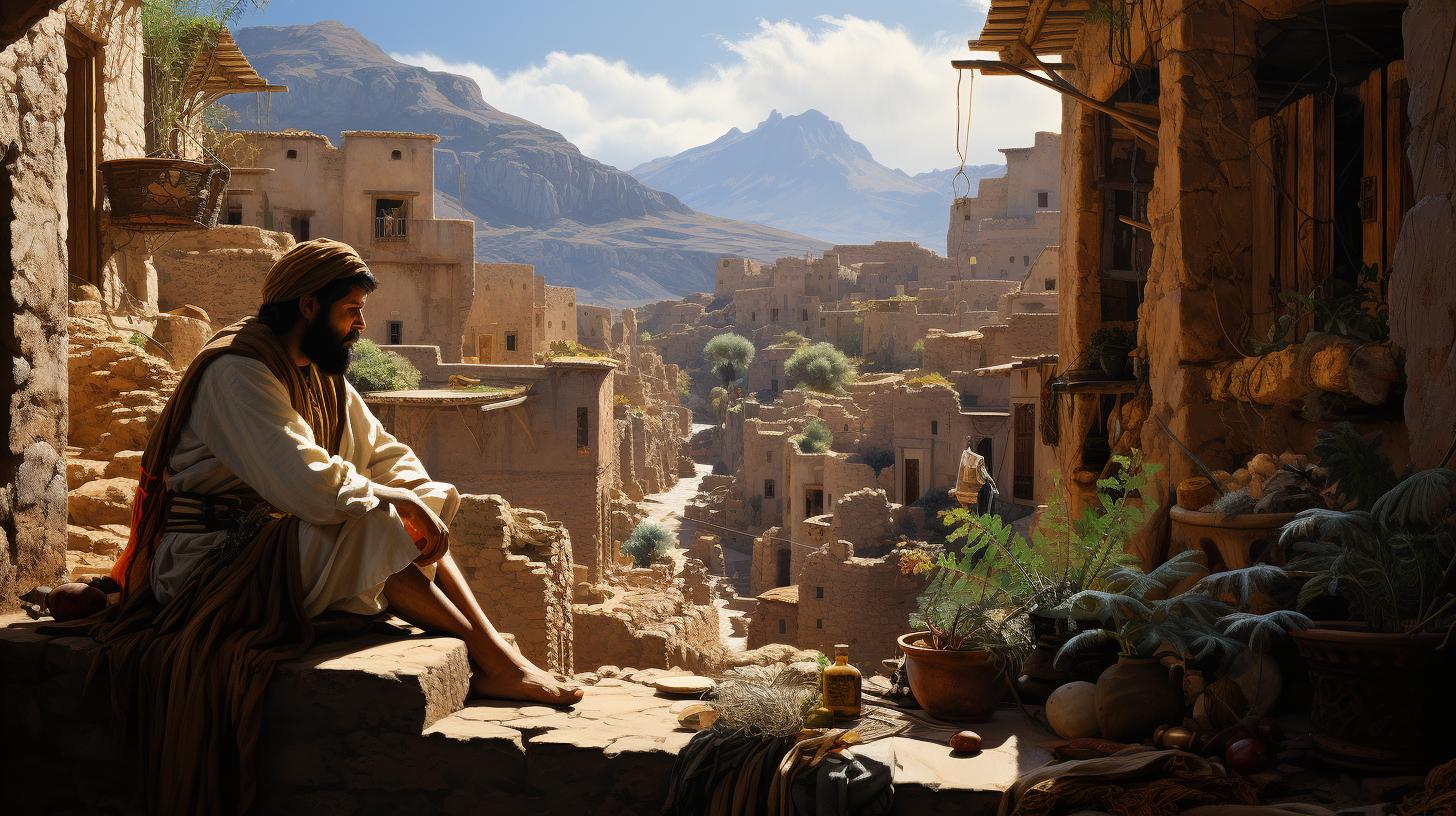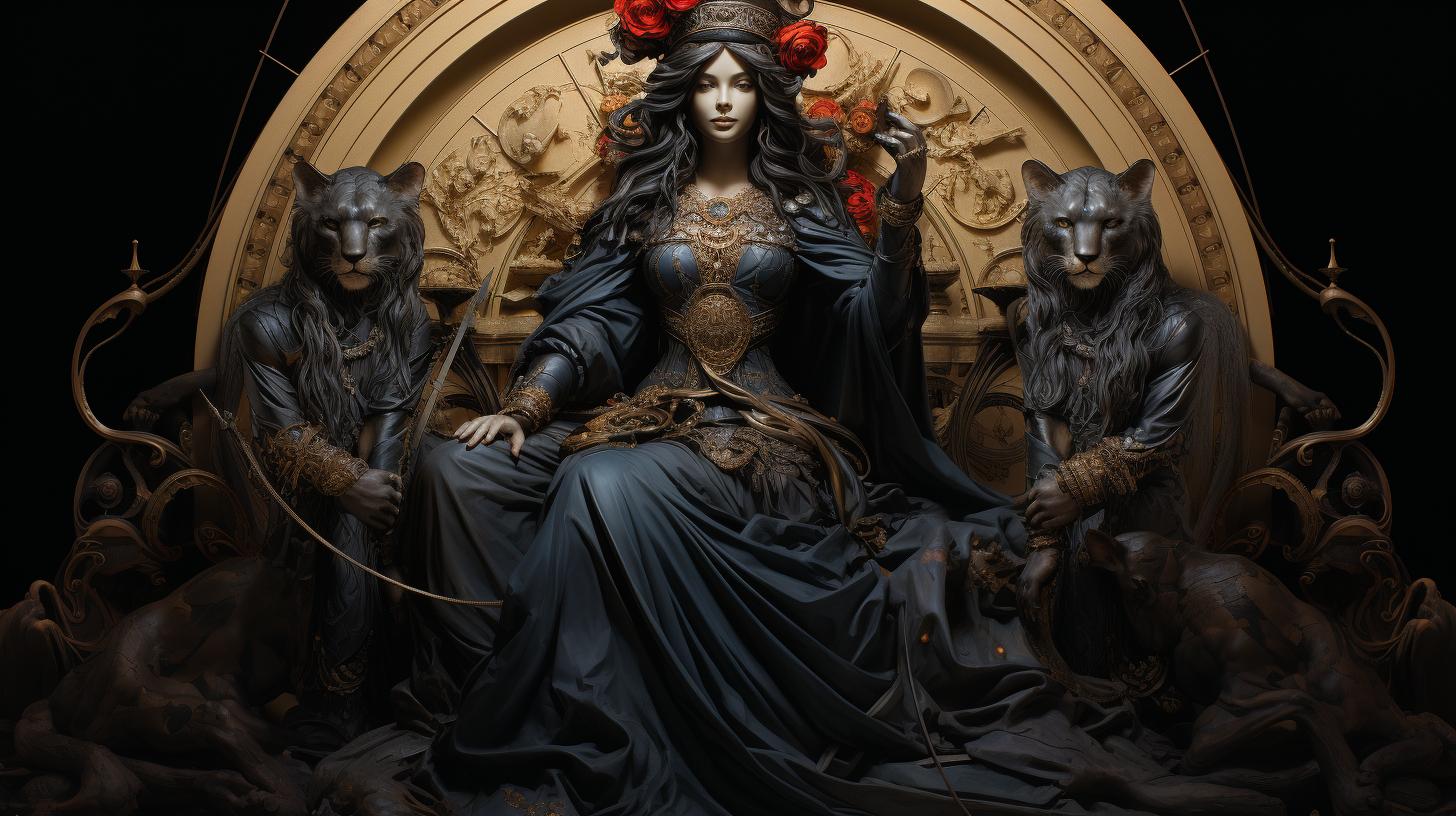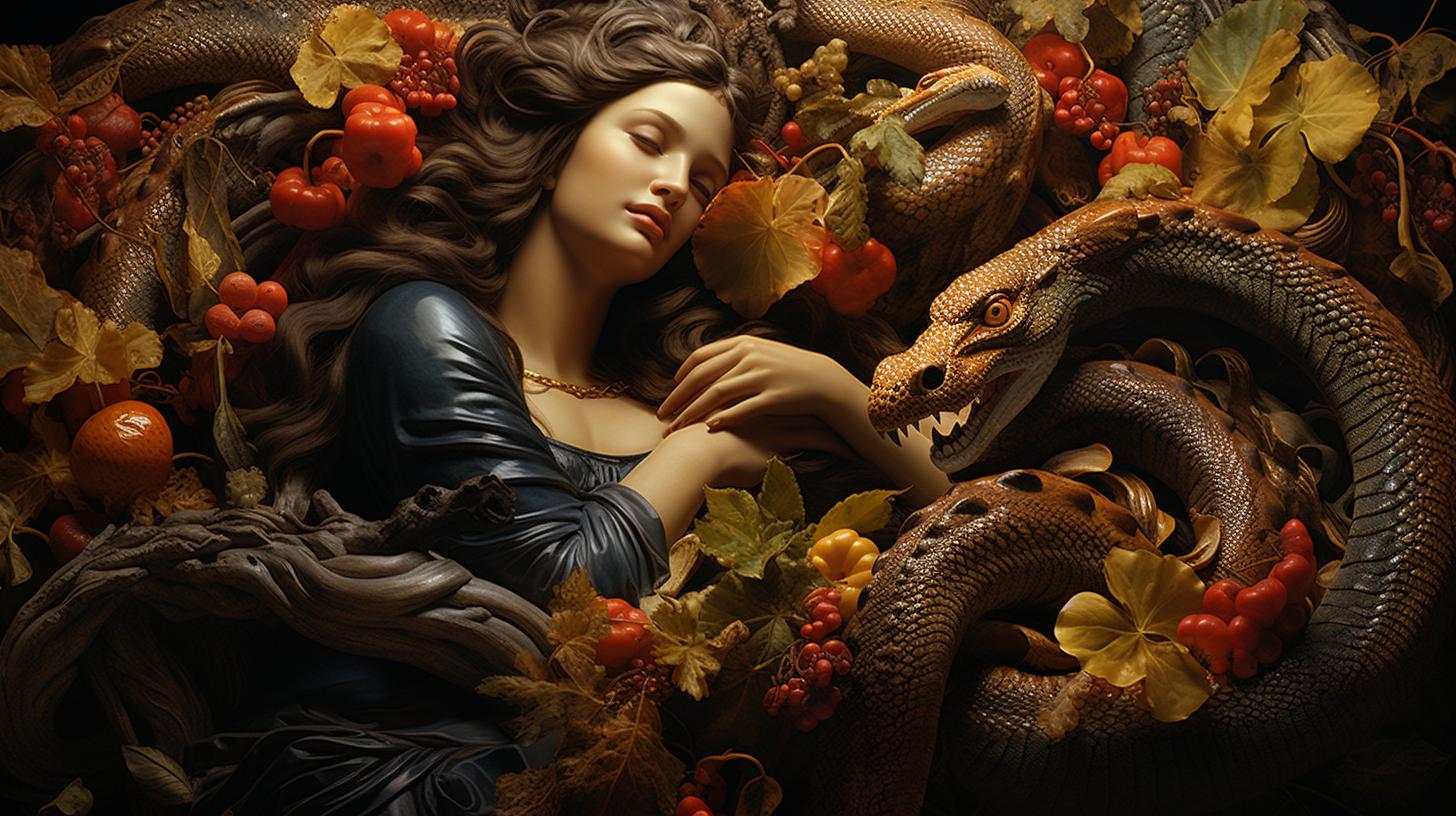Lares Roman God: Guardian Deities in Ancient Roman Religion

Lares were guardian deities in ancient Roman religion, worshipped in homes alongside the Penates. Represented as youthful figures, Lares held a drinking horn and cup. They were also present in the form of images positioned on either side of the central figure of the genius or deities like Vesta. Lares compitales were worshipped at crossroads, overseeing neighboring districts and celebrated during the annual Compitalia festival.
Public Lares belonged to the state religion, with Lares praestites serving as protective guardians of the city, having a temple on Via Sacra.
The Origins of Lares Roman God
The Roman Empire was a civilization deeply rooted in religious beliefs, with a pantheon of gods and goddesses worshipped throughout its vast territories. Among these deities, the Lares held a unique position as household guardian and protector.
Let’s delve into the origins of Lares and their significance in Roman religion.
The Roman Empire and Religious Beliefs
In the expansive Roman Empire, religion played a crucial role in shaping the social fabric and daily lives of its inhabitants. The Romans worshipped a multitude of deities, both major and minor, with various roles and domains.
Their religious beliefs colored every aspect of their existence, from domestic rituals to civic ceremonies.
Introduction to Lares and their Importance
Among the many gods of the Roman pantheon, the Lares held a special place as the protectors of each household. The term “Lares” refers to the tutelary deities who were venerated in homes, often in association with the Penates, the gods of the pantry and family abundance.
These youthful figures, depicted in artistic representations, were characterized by their short tunics and held a horn for drinking and a cup.
The Lares were considered integral members of the family, entrusted with safeguarding the well-being, prosperity, and fertility of the household.
They were believed to oversee not only the home but also fields, boundaries, roads, maritime routes, agriculture, livestock, cities, the state, and even the army. Their prominent role transcended boundaries and encompassed diverse aspects of Roman life.
Furthermore, the Lares were associated with other important deities, such as Vesta, the goddess of the hearth and home, and the Genius, who represented an individual’s unique persona and character.
Together, these interconnected deities formed a vital triad in the religious life of Romans.
The importance of Lares in Roman religion cannot be overstated. Their presence and reverence in every household were believed to be integral to maintaining harmony, protection, and prosperity.
Rituals, offerings, and prayers were offered regularly to appease and express gratitude to these divine guardians.
In the following sections, we will explore in-depth the role of Lares in ancient Roman religion, their connection with other deities, and the worship and festivals associated with them.
Join us as we unravel the fascinating world of Lares Roman God.
The Role of Lares in Ancient Roman Religion
In ancient Roman religion, Lares played a significant role as guardians and protectors of each household. They were revered as deities that watched over and ensured the well-being and prosperity of the family.
Let’s explore their connection with the Penates and family prosperity, as well as their association with the Genius and Vesta.
Guardians and Protectors of Each Household
Lares were believed to be intimately involved in the daily lives of families, watching over their homes and offering protection from harm. They were considered as personal deities, ensuring the safety and prosperity of the household members.
Religious rituals and prayers were dedicated to the Lares to seek their favor and guidance.
Connection with the Penates and Family Prosperity
A significant aspect of Lares’ role in ancient Roman religion was their close association with the Penates, the gods of the pantry and family prosperity. These deities worked together to ensure the abundance of food, wealth, and overall well-being within the household.
Lares were seen as essential figures in maintaining family harmony and success.
Association with the Genius and Vesta
In addition to their role as household protectors, Lares shared a connection with the Genius and Vesta. The Genius, representing the individual’s inner spirit and character, was believed to be guarded and influenced by the Lares.
Vesta, the goddess of the hearth and home, also shared a close association with the Lares, as both were essential for the overall harmony and prosperity of the household.
In conclusion, Lares played a crucial role in ancient Roman religion, serving as guardians and protectors of each household.
They were deeply interconnected with the Penates, contributing to family prosperity and ensuring the well-being of the household members. Their association with the Genius and Vesta further emphasized their significance in maintaining harmony and success within the home.
Worship and Festivals Associated with Lares
The worship of Lares in ancient Roman religion was an integral part of household rituals and festivals. These deities were considered guardians and protectors of each household, ensuring the well-being and prosperity of the family.
Let’s explore the various aspects of their worship and the festivals associated with them.
Household Worship and Offerings
Lares were venerated in the privacy of homes, where families set up small shrines or altars dedicated to their worship. Regular offerings, such as food, wine, and incense, were made to appease and honor these deities.
The household members would gather around the shrine, offering prayers and expressing gratitude for the protection and blessings bestowed upon them by the Lares. It was believed that by maintaining a good relationship with the Lares through these rituals, harmony, and prosperity would prevail within the household.
Compitalia Festival and Worship at Crossroads
One of the significant festivals associated with the Lares was the Compitalia, which was celebrated annually. During this festival, the community would come together to honor not only the Lares but also the Lares compitales, who were specifically associated with crossroads.
These Lares were believed to preside over the neighboring areas and were worshipped to ensure the well-being of the entire district. The Compitalia festival included public ceremonies, feasting, and processions, bringing people together in a spirit of communal celebration and gratitude.
Lares Praestites and their Temple on Via Sacra
In addition to their presence in homes, the Lares also had a significant role in Roman society as protectors of the city. The Lares praestites were the guardian deities of the state and had a dedicated temple located on the prestigious Via Sacra.
This temple served as a center for public devotion and played a vital role in the religious, social, and political life of the city. The Lares praestites were revered by the citizens and worshipped by offering prayers and sacrifices to ensure the welfare of the city and its inhabitants.
Different Categories of Lares and their Domains
The Lares in ancient Roman religion were not just a singular entity but encompassed various categories with their specific domains and functions.
Augusti, Compitalicii, Domestici, and Familiares
- The Augusti Lares were associated with the imperial family and were worshipped in public spaces.
- The Compitalicii Lares presided over the crossroads and had an annual festival called Compitalia.
- The Domestici Lares were worshipped in individual households, playing a central role in family rituals.
- The Familiares Lares were the ancestral Lares, revered as the guardians of the family lineage.
Grundules, Militaris, Patrii, and Permarini
- The Grundules Lares were guardians of the land, overseeing fertility and agricultural activities.
- The Militaris Lares protected the Roman army and were worshipped for victorious campaigns.
- The Patrii Lares were associated with the city and its history, safeguarding its prosperity.
- The Permarini Lares were revered as the protectors of seafarers and maritime activities.
Lares Praestites and Their Role in the City
The Lares Praestites were revered as the guardian deities of the city and had a temple on Via Sacra, one of the most important religious sites in ancient Rome.
They played a crucial role in protecting the city’s well-being and were worshipped regularly with offerings and prayers.
The Lares Praestites were believed to watch over the streets, boundaries, and overall welfare of the community, ensuring its stability and prosperity.
The various categories of Lares represented a diverse array of responsibilities and domains, each playing a crucial part in the religious and cultural fabric of ancient Roman society.
Other Spiritual Beings in Roman Religion
In addition to the Lares, the Roman religion also revered and honored various other spiritual beings.
These beings played significant roles in the religious beliefs and practices of ancient Romans.
Parentes, Manes, and Lemures
- Parentes: These were the souls of deceased ancestors, and they were held in high regard by the Romans. They were considered as protective spirits and were often invoked for guidance and blessings.
- Manes: The Manes were the collective souls of all the deceased individuals.
They were believed to reside in the underworld and were offered prayers and offerings to ensure their peaceful existence.
- Lemures: Lemures were malevolent spirits of the dead. The Romans believed that these spirits could cause harm and unrest.
Special rituals and propitiatory offerings were performed to appease them.
Genius and Genius Loci
The Genius was an essential concept in Roman religion. It was believed to be the individual guardian spirit that resided in each person. The Genius was associated with an individual’s character, personality, and creative abilities.
On the other hand, the Genius Loci was the guardian spirit associated with a specific place. Each location was believed to have its own protective spirit, whether it was a natural site, a house, or even a city.
The Genius Loci ensured the well-being and harmony of the designated location.
Umbrae and their Unfulfilled Funeral Rites
Umbrae were the spirits of the deceased who had not received proper funeral rites. These spirits were believed to wander restlessly and could potentially bring misfortune and unrest to the living if not appeased.
Funerals and rituals were performed to ensure that the Umbrae found rest and peace.
In Roman religious beliefs, these various spiritual beings played integral roles in ensuring the well-being, protection, and harmony in both the earthly and spiritual realms.
The Importance of Lares, Janus, and Vesta in the Home
In ancient Roman religion, the worship of Lares played a significant role in ensuring the well-being and prosperity of the household. Alongside Lares, two other deities, Janus and Vesta, were also considered vital in maintaining harmonious domestic life.
Janus: God of Beginnings and Guardian of Passages
Janus occupied a unique position in Roman mythology as he presided over transitions and beginnings. As the god of doorways, gates, and passages, Janus was believed to protect these entrances, both physical and metaphorical, from evil spirits and malevolent influences.
Households sought Janus’ favor to invoke his blessings for successful ventures, safe travels, and prosperous beginnings. This deity was especially revered during the month of January, which was named after Janus and served as a time for new beginnings and setting resolutions.
Vesta: Goddess of the Hearth and Home
Vesta, the goddess of the hearth and home, held a central place in Roman religious practices. She was worshipped as the guardian of the sacred fire that symbolized the warmth and vitality of the household.
Vesta’s sacred flame was perpetually lit and maintained by the Vestal Virgins in her temple.
As the protector of the hearth, Vesta ensured domestic harmony, unity, and stability. Household members would offer prayers and make offerings to Vesta, seeking her divine protection and guidance for their family.
The welfare of Vesta’s flame was closely tied to the prosperity and well-being of the home.
Cult and Worship of Lares for Household Prosperity
The cult of Lares in the Roman home encompassed honoring the ancestral spirits and seeking their guardianship. Lares were believed to be the protective deities of the household, responsible for safeguarding its residents, fields, and livestock.
Their presence was crucial in ensuring the prosperity and fertility of the family.
Household members would dedicate altars or shrines to the Lares, where regular offerings, such as food, wine, and incense, were made.
The family would express their gratitude for the Lares’ protection and guidance through prayers and rituals.
The worship of Lares was seen as a way to maintain a strong connection with the ancestors, ensuring their continued support and blessings for the household.
These rituals served as a means of fostering a sense of familial identity, unity, and continuity.
- Offerings and prayers were made to Lares for safeguarding the home and family members.
- Members of the household sought Lares’ favor for a bountiful harvest and fertility in their fields and livestock.
- It was believed that Lares had the power to bring prosperity and success to the family’s endeavors.
The worship of Lares, along with the veneration of Janus and Vesta, formed an integral part of Roman religious practices within the home.
These deities were seen as essential protectors and nurturers of the household, ensuring its well-being and prosperity.
Source: Lares Roman God – The Importance of Lares, Janus, and Vesta in the Home
.




















